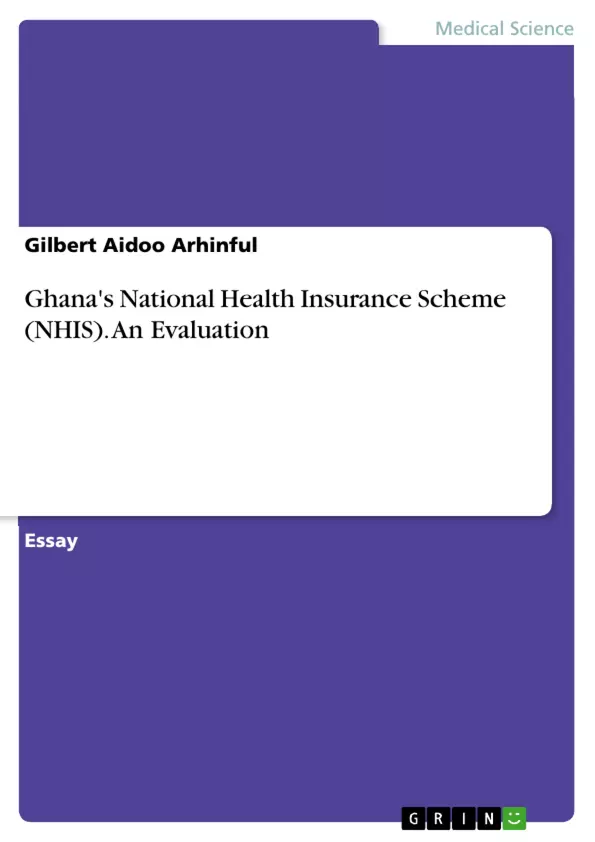Policy evaluation involves six primary criteria; and this paper examined these criteria vis-à-vis the Ghana's National Health Insurance Scheme (NHIS) policy in Ghana.
Policy evaluation is a very important tool for assessing progress of policy, projects and programmes implementation. It involves a number of processes including, central analysis and preparation of ideas about values, objectives, priorities and claims about facts and cause-effect linkages. This enable analysts to produce valuations about past or possible future actions by public agencies.
Inhaltsverzeichnis (Table of Contents)
- INTRODUCTION
- A BRIEF APPRAISAL OF GHANA'S NHIS POLICY
- Efficiency
- Effectiveness
- Impact
- Relevance
- Sustainability
- Policy Consistency
- CONCLUSION
Zielsetzung und Themenschwerpunkte (Objectives and Key Themes)
This paper examines Ghana's National Health Insurance Scheme (NHIS) with the aim of assessing its efficiency, effectiveness, impact, relevance, sustainability, and policy consistency.
- Efficiency: Measures the use of resources in achieving policy objectives, including cost-effectiveness and resource productivity.
- Effectiveness: Determines the extent to which the NHIS achieves its intended outcomes, including providing financial risk protection, reducing mortality, and achieving universal healthcare access.
- Impact: Evaluates the broader consequences of the NHIS, both positive and negative, on beneficiaries and other stakeholders, including economic, social, and health impacts.
- Relevance: Examines whether the NHIS aligns with population needs and national priorities, and its ongoing usefulness and importance.
- Sustainability: Assesses the long-term viability of the NHIS, including its financial and institutional sustainability, and the continued support of stakeholders.
Zusammenfassung der Kapitel (Chapter Summaries)
- INTRODUCTION: This chapter introduces the concept of policy evaluation and its different stages, emphasizing its importance in assessing the significance, performance, and efficacy of a policy. It highlights the specific objectives of this paper, which is to evaluate the NHIS in Ghana.
- A BRIEF APPRAISAL OF GHANA'S NHIS POLICY: This section delves into the six key criteria used to evaluate the NHIS, namely:
- Efficiency: This sub-section examines the NHIS's ability to achieve its objectives with optimal resource utilization, focusing on both the quantity and quality of healthcare services provided.
- Effectiveness: This section assesses the extent to which the NHIS has achieved its specific objectives, such as providing financial risk protection and reducing mortality rates.
- Impact: Here, the paper explores the broader consequences of the NHIS on beneficiaries and other stakeholders, including both positive and negative effects on health, economic development, and social well-being.
- Relevance: This section examines the degree to which the NHIS aligns with population needs, national priorities, and the overall rationale for its implementation.
- Sustainability: This sub-section discusses the long-term viability of the NHIS, considering its financial, institutional, and community support, and its ability to sustain benefits beyond external support.
- Policy Consistency: This section analyzes the coherence and consistency of the NHIS with other policy interventions, aiming to ensure that its effects do not conflict with other development objectives and that it remains consistent in its approach.
Schlüsselwörter (Keywords)
Key concepts explored in this work include policy evaluation, efficiency, effectiveness, impact, relevance, sustainability, policy consistency, National Health Insurance Scheme (NHIS), healthcare access, financial risk protection, mortality rates, health outcomes, economic development, social impact, stakeholder engagement, and long-term viability.
Frequently Asked Questions
What is Ghana's National Health Insurance Scheme (NHIS)?
The NHIS is a social health insurance program established by the Ghanaian government to provide financial risk protection and ensure universal healthcare access for its citizens.
How is the efficiency of the NHIS evaluated?
Efficiency is measured by how well the scheme uses its financial and human resources to achieve its objectives, focusing on cost-effectiveness and service quality.
Has the NHIS been effective in reducing mortality?
The evaluation determines effectiveness by analyzing whether the scheme has successfully reached its goals, such as lowering mortality rates and increasing healthcare utilization.
What are the sustainability challenges of the NHIS?
Sustainability concerns involve the long-term financial viability of the scheme, institutional capacity, and maintaining stakeholder support without over-reliance on external aid.
What does "Policy Consistency" mean in the NHIS context?
Consistency refers to how well the NHIS aligns with other national development goals and ensures that its implementation does not conflict with other public policy interventions.
What is the broader impact of the NHIS on the population?
The impact assessment looks at the overall social and economic consequences, including improved health outcomes and reduced out-of-pocket spending for poor households.
- Arbeit zitieren
- Gilbert Aidoo Arhinful (Autor:in), 2018, Ghana's National Health Insurance Scheme (NHIS). An Evaluation, München, GRIN Verlag, https://www.grin.com/document/1129504



